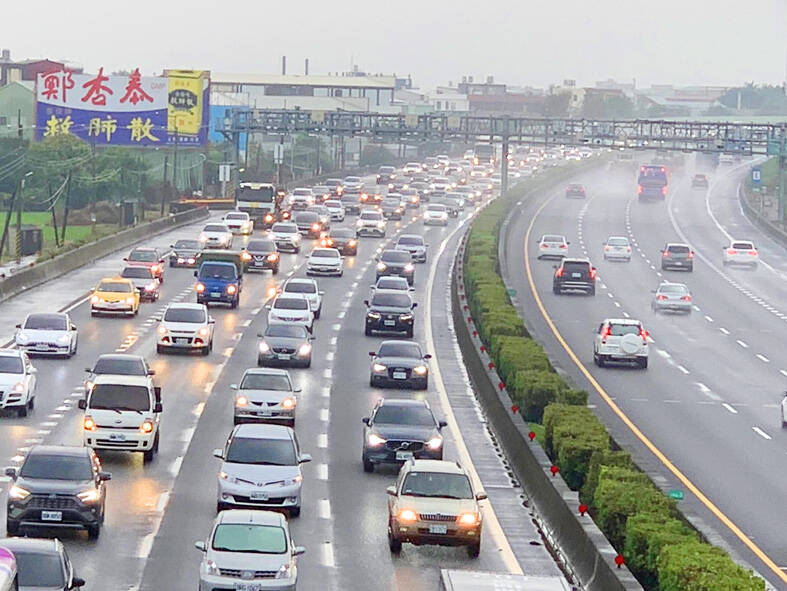The Taiwan Transportation Safety Board yesterday pledged to work with the Ministry of Transportation and Communications to review laws in other countries governing the regulation of self-driving vehicles following a rise in collisions caused by the vehicles, the board’s acting chairwoman Iris Hsu (許悅玲) said at a meeting of the legislature’s Transportation Committee.
Democratic Progressive Party (DPP) Legislator Hsu Chih-chieh (許智傑) said that 36 incidents of self-driving automobiles colliding with construction vehicles on freeways were recorded in 2021.
Last year, four people died in collisions caused by self-driving vehicles, he said.

Photo: Tang Shih-ming, Taipei Times
Over the past two years, 87 percent of collisions with freeway construction vehicles were caused by vehicles equipped with an advanced driver assistance system, he added.
Although the number of self-driving vehicles in the nation has been rising, laws to regulate them have yet to be drafted, Hsu Chih-chieh said.
“The US, Japan and Germany have already put relevant regulations in place. Taiwan only has the Unmanned Vehicles Technology Innovative Experimentation Act (無人載具科技創新實驗條例),” he said.
“Should we not identify laws that should be in place and establish a mechanism to investigate incidents caused by self-driving vehicles or autonomous buses?” he asked.
The safety board has experts to study self-driving vehicles and should bear some responsibility to regulate them, he added.
The transportation ministry, rather than the safety board, is in charge of regulating self-driving vehicles, Iris Hsu said.
“We have exchanged views on issues related to self-driving vehicles with academic experts. As an independent investigative agency, we cannot be players and referees at the same time… We can work with the ministry to review regulations in other countries,” she said.
Safety board employees appear to spend more time engaging in personal conflicts instead of investigating transportation incidents, DPP Legislator Lin Chun-hsien (林俊憲) said.
Although the board last year investigated nearly 60 marine incidents, it only investigated four aviation incidents, seven railway incidents and three highway incidents, Lin said.
“Despite more people using the highway system than marine transportation, the board investigated so few highway incidents last year because the criteria to launch investigations has been set too high,” he said.
“A highway incident must result in at least three deaths, at least 10 deaths and injuries, or at least 15 injuries to warrant an investigation,” he said.
The US National Transportation Safety Board investigates incidents if they pose “potential systemic risks,” he said.
“We do not see the board publish similar reports. Instead, we are seeing board employees engaging in internal fights by reporting each other’s wrongdoings, which is a waste of taxpayers’ money. The board is allocated a budget of about NT$200 million [US$6.5 million] per year,” he said.
“The agency’s budget plan for the next fiscal year should be subject to stricter scrutiny,” he added.
Lin also criticized the board for being slow to build capacity for investigating incidents caused by self-driving vehicles. As of March 28, 29 freeway construction vehicle collision accidents had been reported, with most of them caused by vehicles equipped with advanced driver assistance systems, he said.
Former safety board chairman Young Hong-tsu (楊宏智) in February resigned following allegations that he visited family members and conducted other private affairs during work hours.

An essay competition jointly organized by a local writing society and a publisher affiliated with the Chinese Communist Party (CCP) might have contravened the Act Governing Relations Between the People of the Taiwan Area and the Mainland Area (臺灣地區與大陸地區人民關係條例), the Mainland Affairs Council (MAC) said on Thursday. “In this case, the partner organization is clearly an agency under the CCP’s Fujian Provincial Committee,” MAC Deputy Minister and spokesperson Liang Wen-chieh (梁文傑) said at a news briefing in Taipei. “It also involves bringing Taiwanese students to China with all-expenses-paid arrangements to attend award ceremonies and camps,” Liang said. Those two “characteristics” are typically sufficient

A magnitude 5.9 earthquake that struck about 33km off the coast of Hualien City was the "main shock" in a series of quakes in the area, with aftershocks expected over the next three days, the Central Weather Administration (CWA) said yesterday. Prior to the magnitude 5.9 quake shaking most of Taiwan at 6:53pm yesterday, six other earthquakes stronger than a magnitude of 4, starting with a magnitude 5.5 quake at 6:09pm, occurred in the area. CWA Seismological Center Director Wu Chien-fu (吳健富) confirmed that the quakes were all part of the same series and that the magnitude 5.5 temblor was

The Central Weather Administration has issued a heat alert for southeastern Taiwan, warning of temperatures as high as 36°C today, while alerting some coastal areas of strong winds later in the day. Kaohsiung’s Neimen District (內門) and Pingtung County’s Neipu Township (內埔) are under an orange heat alert, which warns of temperatures as high as 36°C for three consecutive days, the CWA said, citing southwest winds. The heat would also extend to Tainan’s Nansi (楠西) and Yujing (玉井) districts, as well as Pingtung’s Gaoshu (高樹), Yanpu (鹽埔) and Majia (瑪家) townships, it said, forecasting highs of up to 36°C in those areas

The brilliant blue waters, thick foliage and bucolic atmosphere on this seemingly idyllic archipelago deep in the Pacific Ocean belie the key role it now plays in a titanic geopolitical struggle. Palau is again on the front line as China, and the US and its allies prepare their forces in an intensifying contest for control over the Asia-Pacific region. The democratic nation of just 17,000 people hosts US-controlled airstrips and soon-to-be-completed radar installations that the US military describes as “critical” to monitoring vast swathes of water and airspace. It is also a key piece of the second island chain, a string of